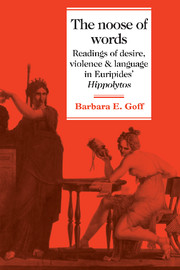1 - Speech and silence
Published online by Cambridge University Press: 05 February 2010
Summary
At Hippolytos 293–6 the Nurse says to Phaidra, as part of her attempt to persuade her mistress to speak, ‘and if you are sick with some one of the unspeakable [aporrheton] evils, these women [are here] to help with the disease; but if your condition [sumphora, also meaning misfortune, calamity] can be carried out towards the men [lit. if it is ekphoros], speak, so that it may be revealed to doctors’. Several pairs of oppositions are at work in these lines. Certain diseases are called ‘unspeakable’, and are said to be the concern exclusively of women. The unspeakable diseases may be dealt with only among women, in a place which we can define as the ‘inside’, as opposed to where the men are; others may be taken outside, to the men, and spoken of openly. Significantly, the word menuo which the Nurse uses when speaking of the doctors and which I have translated as ‘reveal’, is repeated by Phaidra at 520 when she expresses her fear that the Nurse will reveal all to Hippolytos. The masculine realm seems to be that of the exterior and of real speech; women and women's realm are defined as unspeakable, so that their speech among themselves can almost be considered a form of silence. If this seems an over–interpretation, I would argue that it is borne out later by Hippolytos' tirade, in which he deploys the same pairs of oppositions.
- Type
- Chapter
- Information
- The Noose of WordsReadings of Desire, Violence and Language in Euripides' Hippolytos, pp. 1 - 26Publisher: Cambridge University PressPrint publication year: 1990



